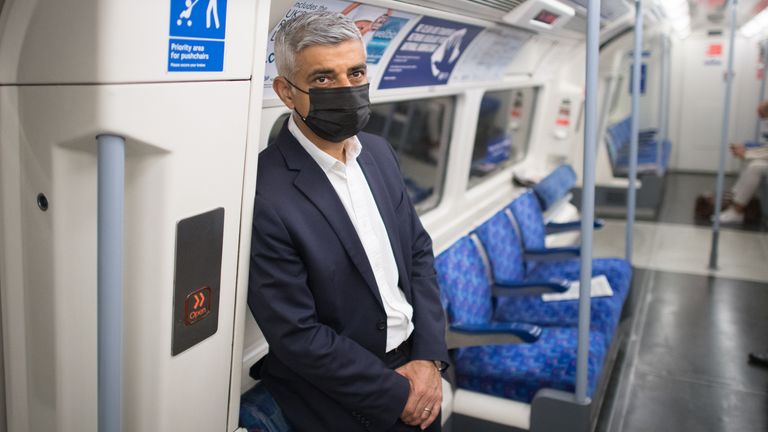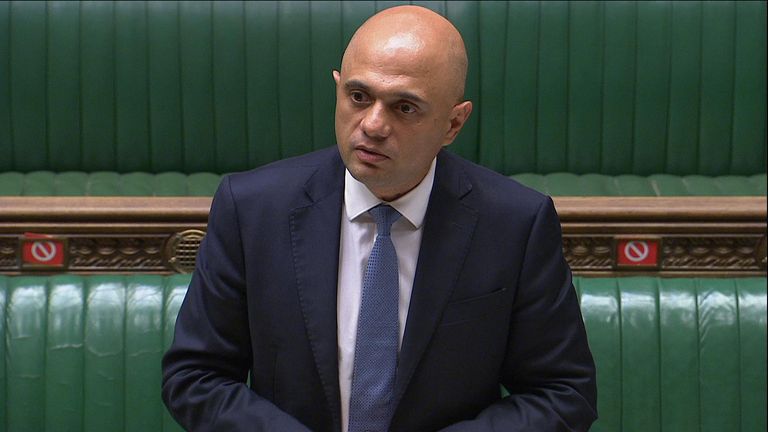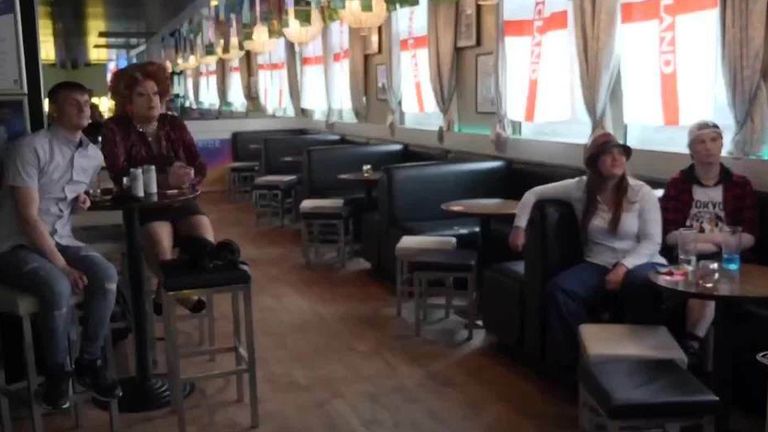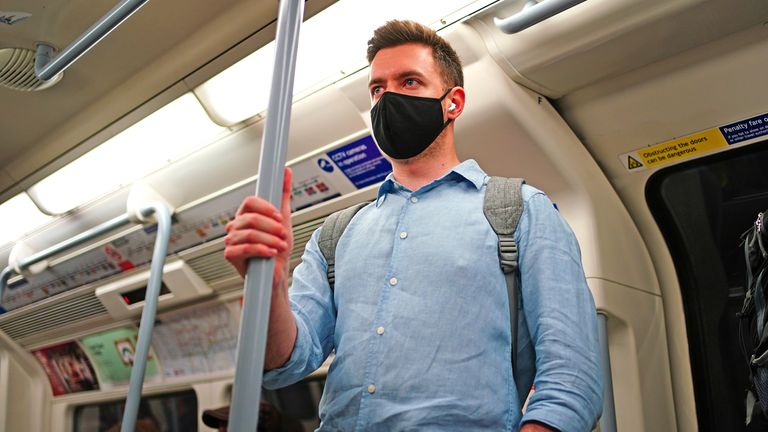Sadiq Khan has said Transport for London will continue to enforce the wearing of face masks on services in the capital beyond 19 July.
From Monday, the legal requirement to wear face masks on public transport in England will end as part of the government's roadmap for easing COVID-19 restrictions.
But Boris Johnson has called on the public to exercise "personal responsibility" and continue to wear masks in "crowded and enclosed spaces".
Transport Secretary Grant Shapps told MPs last week that he was "very relaxed" about airlines, train firms and bus operators imposing their own COVID-related rules, including on wearing face masks, beyond 19 July.
Industry bodies said on Tuesday that no domestic train operators or major bus and coach firms will require passengers to wear masks from Monday.
However, Mr Khan has said he is "not prepared to stand by and put Londoners, and our city's recovery, at risk" by not continuing to enforce mask-wearing.
He has asked TfL to make mask-wearing a "condition of carriage" after 19 July.
The London mayor said: "By keeping face masks mandatory we will give Londoners and visitors the reassurance and confidence to make the most of what our city has to offer, while also protecting our heroic transport workers and those who may be vulnerable and rely on the network to get around our city.
"It's an extra layer of protection on top of TfL's world-leading enhanced cleaning regime - and I'm sure Londoners will continue to do the right thing as they have done throughout the pandemic, and continue to wear a face covering on TfL services."
Mr Khan said the "simplest and safest option" would have been for the government to keep the legal requirement for mask-wearing in place.
Critics of the government's approach have accused ministers of sending mixed messages, questioning why the mask mandate is being removed when members of the public will still be expected to wear them in some settings.
"As we've set out, we're moving from a universal government diktat to relying on people's personal responsibility," a government spokeswoman said.
"The guidance is clear that people are expected and recommended to wear a mask when they come into contact with people they don't normally meet in enclosed and crowded spaces.
"It is open to transport operators to decide if they want to take further measures."
Manuel Cortes, general secretary of the Transport Salaried Staffs Association union, welcomed the London mayor's call.
"We welcome this move and hope that TfL, other transport authorities and rail operators will take similar measures to protect both staff and passengers," he said.
"Continuing to wear face coverings in crowded areas is simple, sensible and will boost confidence in public transport."
Mick Lynch, general secretary of the Rail, Maritime and Transport (RMT) union, said there should be "consistency" across local and national services.
"This is welcome from the London mayor and is consistent with the position currently adopted in Scotland, Wales and on Eurostar," he said.
"However, we now have the ludicrous position where a passenger travelling through London will have different rules on the tube and the main line services.
"The train operating companies and the government should be following this lead in the name of consistency, common sense and public safety."
Passengers on all TfL services - including the Tube, bus, tram Docklands Light Railway, Overground and TfL Rail - will need to keep wearing a face covering in stations and for the entirety of their journey unless they are exempt.
Enforcement officers in London would be able to deny access or eject passengers who are found to not be complying with the mask requirement.
Station staff and bus drivers will continue to remind users of London's transport network that face masks are a requirement post-19 July, while enforcement officers will be able to refuse entry to people not wearing one and who do not have a valid exemption.
They will also be able to ask people to leave services for failing to comply.
Mr Khan has also asked TfL to ensure that mask-wearing continues in taxis and private hire vehicles, both from drivers and passengers unless they are exempt.
According to TfL, almost 212,000 people over the past year have been stopped by enforcement officers and required to put on a face mask before getting on a service.
Nearly 14,000 people have been prevented from boarding while 3,200 have been ejected, TfL said.
A total of 4,300 fixed penalty notices have been handed out since the rules around mask-wearing came into force last summer.
Tube use is around 40-45% of pre-pandemic levels while bus usage is around 60-65%, according to TfL.
https://news.google.com/__i/rss/rd/articles/CBMikgFodHRwczovL25ld3Muc2t5LmNvbS9zdG9yeS9jb3ZpZC0xOS1sb25kb24tbWF5b3Itc2FkaXEta2hhbi1vcmRlcnMtdHJhbnNwb3J0LWZvci1sb25kb24tdG8tZW5mb3JjZS1tYXNrLXdlYXJpbmctb24tc2VydmljZXMtYWZ0ZXItMTktanVseS0xMjM1NTIxMdIBlgFodHRwczovL25ld3Muc2t5LmNvbS9zdG9yeS9hbXAvY292aWQtMTktbG9uZG9uLW1heW9yLXNhZGlxLWtoYW4tb3JkZXJzLXRyYW5zcG9ydC1mb3ItbG9uZG9uLXRvLWVuZm9yY2UtbWFzay13ZWFyaW5nLW9uLXNlcnZpY2VzLWFmdGVyLTE5LWp1bHktMTIzNTUyMTE?oc=5
2021-07-14 00:13:58Z
52781731015441




Tidak ada komentar:
Posting Komentar